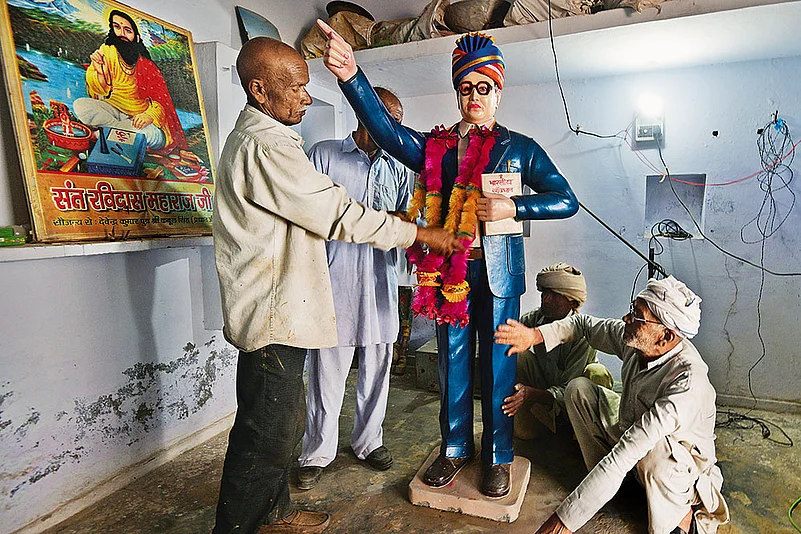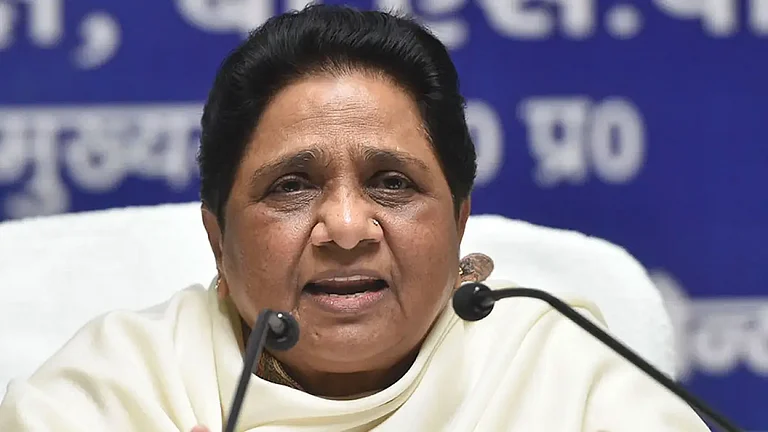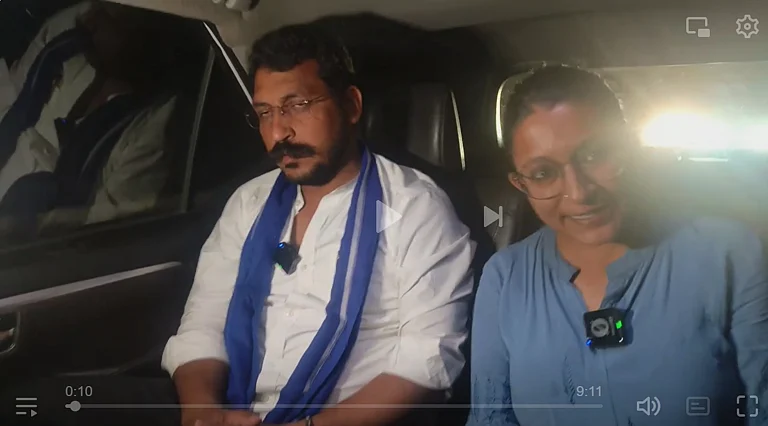A pocket-sized photograph of B R Ambedkar (Babasaheb) hangs on a makeshift tarpaulin “wall” of a tea stall that Laxmi, 33, and her husband, Rajan Kumar, 37, run in Najibabad town of Bijnor district in Uttar Pradesh (UP). Laxmi, who complains of not having a ration card, has been following the goings-on at a hotel named ‘Najeeb Darbar’ across the street where renegade leader Chandrashekhar Azad Ravan’s Aazad Samaj Party (Kanshi Ram) has set up a temporary office. The four-year-old party was to contest its first Lok Sabha elections from Nagina constituency on April 19. “This time we have two contenders fighting for the legacy of Babasaheb,” Kumar says with a laugh, a week ahead of the polls. While Azad is one, the other is Akash Anand, Bahujan Samaj Party (BSP) supremo Mayawati’s lesser-known uttaradhikari (successor). Pointing at her own steeping kettle as she brews a fresh batch of tea, Laxmi says, “The ketlee (kettle, Azad’s party symbol) seems to be ahead of the haathi (elephant, BSP’s party symbol).”
Hurtling between rallies, Azad said that choosing Nagina was not a strategic move. “We are contesting elections on a minuscule budget. I wanted to contest the elections from any constituency. The party decided to field me from Nagina and I accepted,” says Azad. The political eminence of Nagina, however, may not be lost on him.
Carved out of Bijnor Lok Sabha constituency in 2009, Nagina is significant in many ways—it is a reserved seat with a majority Muslim population followed by Dalits. The constituency has become a prestige battle for Mayawati. It was from Bijnor that the fiery leader, from the historically-oppressed Chamar or Jatav community, burst into India’s electoral politics, winning the 1989 Lok Sabha polls and altering the political landscape of UP, a state with the highest Dalit population (21.1 per cent) in the country. Now, the veteran seems to be relying on her successor—the London-returned MBA and her nephew Anand.

Declared last year as the “successor” of Mayawati, Anand kicked off the party’s campaign rally from Nagina on April 6. The BSP had previously said that Mayawati would be handling UP and Uttarakhand, while Anand would be looking after “party affairs in the states where the organisation is weak”. Party insiders say that ‘Behenji’ (Mayawati) changed tack in a bid to thwart any potential claim made by Azad to Kanshi Ram’s legacy, days after he filed his nomination from Nagina. The party eventually fielded Surendra Pal Singh, dropping its incumbent MP Girish Chandra, but the campaigning done by Anand in Nagina seems to be directed mainly against Azad. At a grand rally earlier this month, Anand, who is the BSP’s national coordinator, did not name Azad, but warned against Dalit leaders who misled the youth, alleging that such leaders ruin the lives of Dalit youth by embroiling them in protests. He also vouched for the “positive politics” and justice-rights-based approach of the BSP.
The emergence of Azad following the 2017 caste violence in Saharanpur between Jatavs and Thakurs revealed a growing shift in the Dalit political identity, especially among the youth. “Our generation has seen the movements led by Kanshi Ram and ‘Behenji’ in the 1980s for political assertion,” says Inder Singh, a septuagenarian farmer from Saharanpur’s Dara Shivpuri region, about 25 km from Chhutmalpur where Azad was born. Azad formed his own group of Ambedkarite rebels and named it the Bhim Army in 2015. He soon hit the headlines after the group emerged on multiple occasions as the face of a new form of Dalit assertion. For instance, when the Thakurs objected to a board with the words “The Great Chamar” that was put up inside the private premises of a Dalit man in 2015, the Bhim Army protested. But it was the 2017 Shabbirpur caste violence, which left one Rajput man dead and over 25 Dalit homes burnt, that brought Azad into the national limelight. The Bhim Army led by Azad emerged as the angry new face of Dalit protests and was even blamed for the violence.
Voters in Uttar Pradesh feel that neither the BSP nor the Aazad Samaj Party truly symbolise the political assertion brewing among the dalit population.
While Azad has claimed to be on cordial terms with Mayawati, the BSP has distanced itself from the leader and his seemingly militant tactics and style of street protest politics. Saharanpur candidate, Majid Ali, said that the BSP has always focused on “bringing about social and political change for the marginalised, but through political participation and democratic people’s movements, unlike some leaders today who want to militarise the youth”. He also alleged that many within the Dalit samaj were silently working for the BJP.
The increasing high-handedness of party leaders, including ‘Behenji’ herself, has left many alienated from the values that the Dalit movement had stood for. “While Mayawati says Dalits should not vacate the chair for anyone, villagers were not allowed to sit on chairs when she was in the room once she became CM,” says Kartik, Inder Singh’s 21-year-old grandson, a first generation graduate from Maharana Pratap Inter College. “She used to hitch rides on bullock carts between villages to campaign for her party earlier. Now she has stopped visiting the villages,” alleges Kartik. He agrees that the Dalit youth need fresh blood and ideas. A member of the Students’ Federation of India (SFI), the student wing of the CPI(M), Kartik opines that neither Azad nor Anand truly symbolise the political assertion brewing among the population.
Among the Dalits of Saharanpur, there is a rising resentment against the alleged “disappearance” of Azad and his Bhim Army in the aftermath of the violence. While the Bhim Army was active in building schools (Bhim Pathshalas) across villages in the region at the time, many of these schools like the one they built in Shabbirpur village, the epicentre of the 2017 clashes, are now defunct. Many also feel that after calling for protests, Azad deserted the villagers, who continue to face criminal charges and court cases related to the violence.
A case in point is Sonu, a farmer and one of the five Dalit men charged with the murder of a Rajput boy seven years ago. Sonu was initially arrested in June 2017, and was later booked under the controversial National Security Act (NSA), 1980, on October 15 in 2017 along with another accused. Azad himself was booked under the NSA a week later. In 2019, Sonu, who was allegedly tired and humiliated by the ongoing legal cases, returned from a court hearing and died by consuming poison. His widow, Rachna, who works in the same fields owned by the Thakurs where her husband had worked, claimed that Sonu was innocent. “He had just joined some protests that were being held. He did not kill anyone,” she says. “The Bhim Army men had promised us legal support, but they didn’t,” she says.
The villagers also asserted that while the Dalits in the region traditionally vote for the BSP, party leaders have stopped working for the community and are more interested in power-politics. “Anand’s naming as Mayawati’s successor has led to resentment among the cadres because we feel the successor of Kanshi Ram should come from the grassroots. It should be someone who has seen and been a part of the movement, and not someone who has just reaped the benefits of it,” says Raj Kishore, a former BSP worker and member of Dr B R Ambedkar Samaj Kalyan Samiti. Another member, Ravi Kumar, recalls how the statue of Ambedkar, over which the 2017 clashes erupted, remains locked in a room. Samiti members are not allowed to display it on the premises of the local Ravidas Temple.
In 2019, the BSP contested the seat in alliance with the Samajwadi Party (SP) and won. But this time, it is fighting on its own, which may split the Muslim votes. Najibabad resident Mohd Imran, 27, who has been attending Azad’s rallies, says that there is fear among Muslims that both Azad and the BSP will support the BJP in the end. “The BSP is not with the INDIA bloc. Azad’s position is also dicey because he did not get the seat from the INDIA bloc. Both are trying to garner the Muslim votes, which traditionally have gone to the SP,” he says.
Dalit organisations like Ravidas Manav Seva Sangh have nonetheless claimed that the BSP is the “B-Team” of the BJP, a surmise that is echoed by an Aligarh Muslim University (AMU) professor and political analyst Mirza Asmer Beg. “It looks like the BSP is clearing the way for the BJP in some seats, perhaps in return for a larger role or more room in the next Vidhan Sabha elections,” says Beg. Such sentiments might end up benefiting the SP-Congress alliance, which has been relying on “PDA” (Pichda, Dalit, Alpasankhyak) formula to consolidate Muslim as well as OBC voters.
Meanwhile Laxmi, the tea stall owner opposite Azad’s Najibabad office, says that whether Azad or Anand wins is immaterial. Her vote will go to the party that works for the downtrodden, especially women. “Here, there is no work for women other than cheap farm labour. I hope whoever comes to power works to provide jobs to women,” she says. But as of now, neither Azad nor Anand have come to seek her vote.
This appeared in the print as 'Next Gen Bahujan'
MORE FROM THIS ISSUE
Rakhi Bose in Nagina, Uttar Pradesh






























